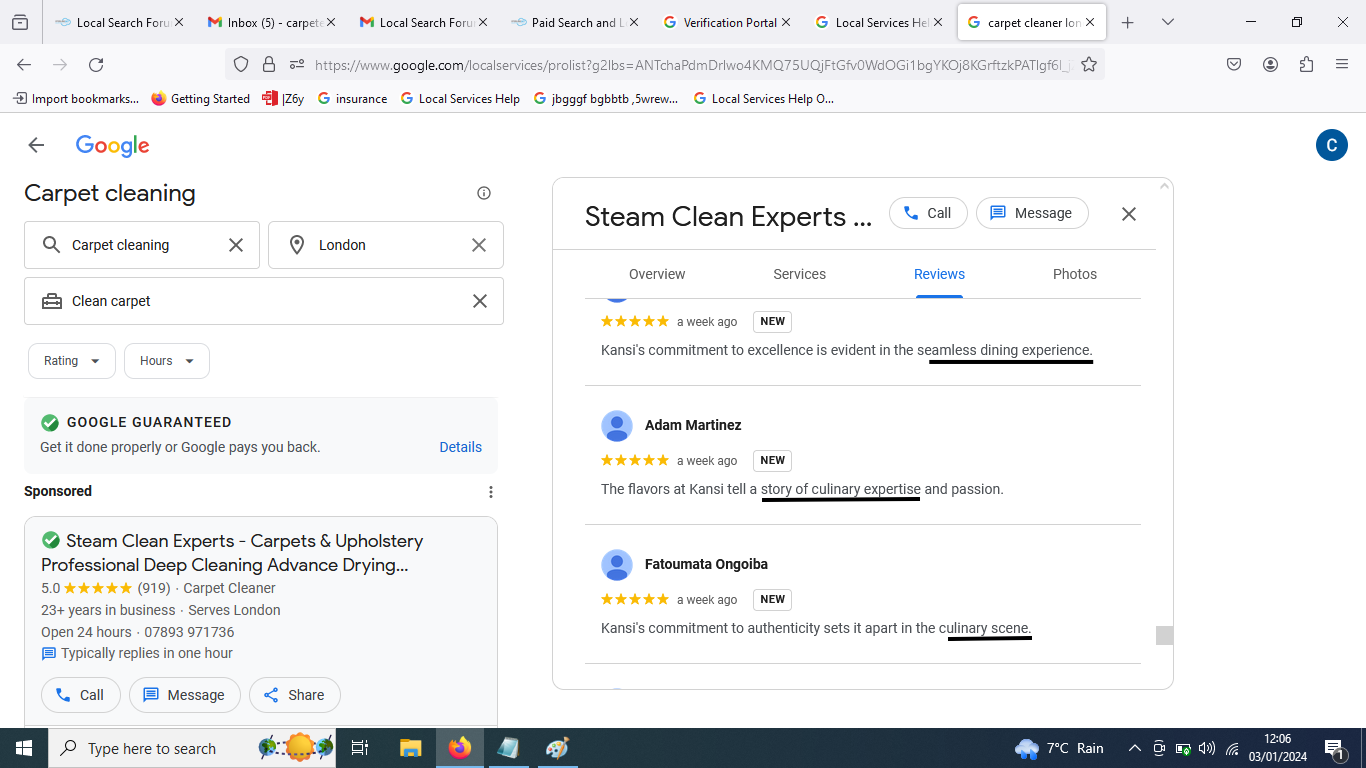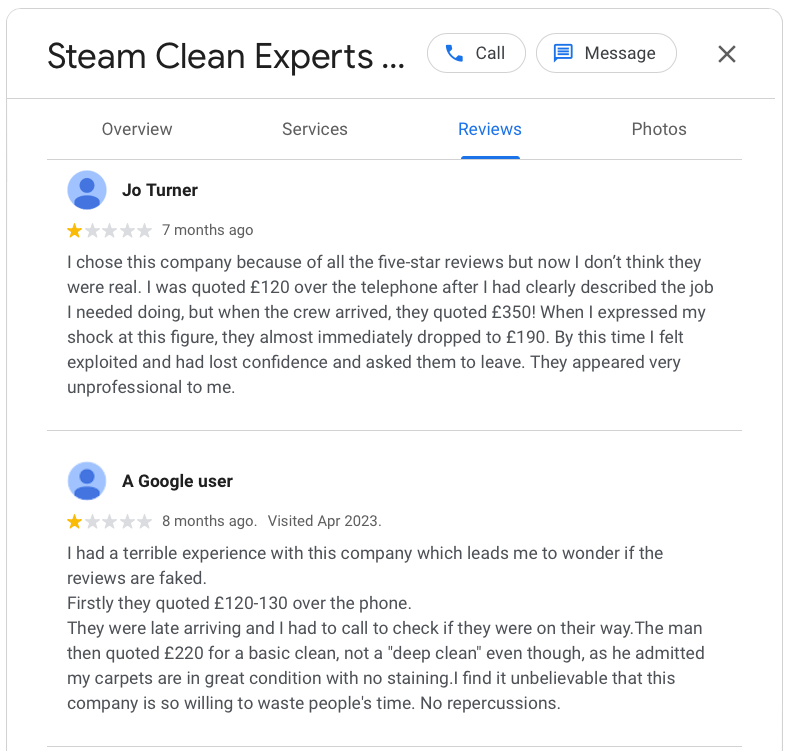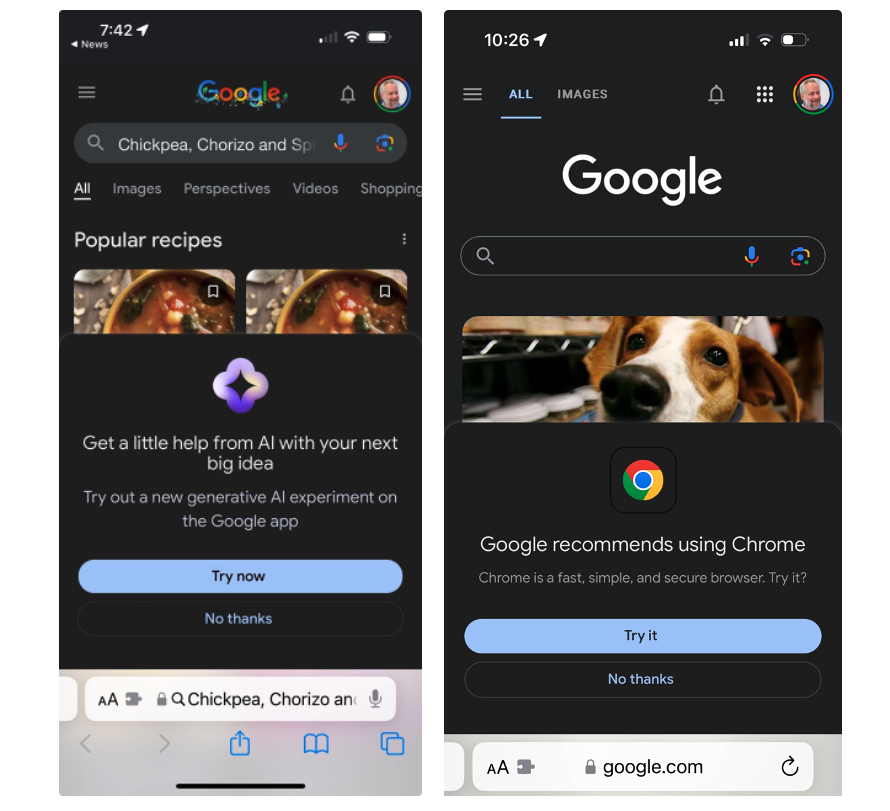LSA Scams in UK, Google Gets Interstitial, You Can't Delete a Listing

Google LSA Scammers Are Winning
Duct Cleaning scams in Local Service Ads (LSAs) are apparently just the tip of the iceberg. Carpet cleaners and plumbers, with large numbers of fake reviews, fake business names and fake licenses, are dominating local search results in much of the UK. As in the US, consumers are fooled by the large number of positive reviews and the Google Guarantee. And, similar to the Duct Cleaning Scam, consumers are subjected to lowball quotes, high bills and shoddy work by sub-contractors. The scams appear to be on the rise in the US as well, with reports of additional sitings in Maryland, Virginia and the DC area. Meanwhile, traditional local businesses that ply these trades are seeing their LSA leads dry up or lead costs go up by 50%. One agency noted, "business owners from all around Maryland are complaining that their LSAs dropped dead about two months ago, after fake businesses appeared. You can see the fake LSA pages ranking in positions 1 and 2 in every single county." Another agency noted, "We've seen the LSA cost per lead skyrocket since they showed up; we were at $54 per lead in August (before we started seeing these fake listings) and it has continued to climb up to $82 per lead since they've shown up." All of this is against the backdrop of Google's claim that "Local Services businesses that advertise directly with Google undergo screening procedures that... may include license, insurance, and background checks," and where there is a "strict policy against" fake reviews, misrepresentation, pricing abuses and lead gen. It's time to redefine the meaning of strict.


Our take:
- Google has seen all of these abuses (fake reviews, fake businesses, etc.) multiple times before with locksmiths, garage door repair and drug rehab.
- When the mainstream press finally catches up with the "Google Guarantee" grift, Google will probably nuke a few fake listings and claim that it is a "cat and mouse game" with bad actors, that they have taken appropriate action and will remain vigilant.
- The bigger farce is that once the noise has died down, Google will likely continue to allow these abuses, as they have done for the past 15 years.
Google Gets All Interstitial
In one more potential antitrust setback, Google is in danger of losing the ability to buy preferred search engine status on the iPhone Safari browser. The last time Google lost its preferred status on the iPhone was during the rollout of Apple Maps. In that case Google lost 60% of Maps traffic. That is apparently informing their current iPhone campaign where Google is aggressively presenting huge interstitial calls to action to abandon Safari and move to either the Google app or Chrome app. For those who don't remember, in 2015 Google announced the first of many site penalties for "mobile web pages that show an app install interstitial that hides a significant amount of content on the transition from the search result page." They would no longer consider those pages to be mobile-friendly and would reduce their rank. At the time Yelp CEO Jeremy Stoppleman correctly accused Google of anti-competitive behavior. When I suggested that there might be better ways of winning customers than imposing huge and annoying interstitials he famously suggested that I delete my account. I am saying the same thing to Google: there are better ways to win customers than by imposing huge and annoying interstitials on your searchers.

Our take:
- Engaging in behavior that they have long criticized and penalized, Google seems to be planning for a loss of default search status on the iPhone.
- There is more than a little irony in Google's bold use of interstitials. An implicit indictment of their previous penalties, it's a desperate way to gain users.
- A likely antitrust remedy would require Apple to offer search engine choice. If so, Bing could gain a few points (and the billions in income that means) but Google would retain significant market share regardless.
You Can't Really Delete Your Listing
For whatever reason, Google let businesses think they could in fact remove their listings from Google Maps. Reading the menu choice in GBP, many businesses thought "remove this profile" meant remove this business from Maps. And every month businesses would stream into the Google Support forum asking how to do just that, only to be told the options were: remove themselves from managing the profile or close the business itself. In both cases the listing remains in the index for all to see. There are numerous legitimate reasons a business might want to remove itself from Maps but Google keeps the business in Maps regardless. There are a few, limited situations where Google Support will in fact remove a business from the index. For example, if the business is an online only business and generated a GBP listing erroneously or if the business was a spam listing and didn't really exist. Phil Rozak detailed the oddball case where you might be able to get a real but closed business removed from the index by removing all citations to a business. But it takes months of work and offers no guarantee. Finally, Google has added some language to the Remove Business Profile option that clearly indicates the business will still appear on Google Maps.

There is no delete button for Google Business Profiles. You can remove all users, leaving a userless (i.e. unclaimed) profile that may or may not get removed from Maps.
— Stefan Somborac (@StefanSomborac) January 4, 2024
Now, the process tells you when the profile will remain visible.
More transparency from Google!
1/3 pic.twitter.com/jCwDzD5nxL
Our take:
- Google has long kept certain pieces of information critical to managing a GBP listing "off the books." When asked, they often said it was to deter spammers.
- New platform transparency laws in Europe have required Google to communicate the what and why of their decisions more clearly.
- This increased transparency is welcome. It shouldn't have taken new legal regimes to actually get it to happen.
Recent Analysis
- Google LSAs Supercharge Duct Cleaning Scam, by Mike Blumenthal
- ICYMI: LSA Spam Scam - It's Deja Vu All Over Again, by Mike Blumenthal
Short Takes
- GBP Video Verification shouldn't be this hard: A Step-by-Step Guide.
- For travel searches Google is auto-creating 'Travel Stories' with GBP images, reviews and links to Google Travel.
- Google Local test provides a "Websites for Places" carousel beneath the Pack.
- For local housing queries Google search is showing specific units available in rental complexes.
- Local Search Developments You Need to Know About From Q4 2023
- How to optimize your GBP landing page.
- GBP How to: remove a reservation button from restaurants.
- Should you change your GBP business hours? The Openness Algorithm Update: Your Top Asked Questions Answered.
- Amazon sellers give low marks to AI-Powered review highlights for too much emphasis on the negative.
- YouTube video growth: estimating total video volume and how it has changed over time.
- The generative "Prompt Of The Year" awards for 2023 with successful AI prompts for everything from job hunting to marketing and data analysis.
Listen to our latest podcast.

How can we make this better? Email us with suggestions and recommendations.
